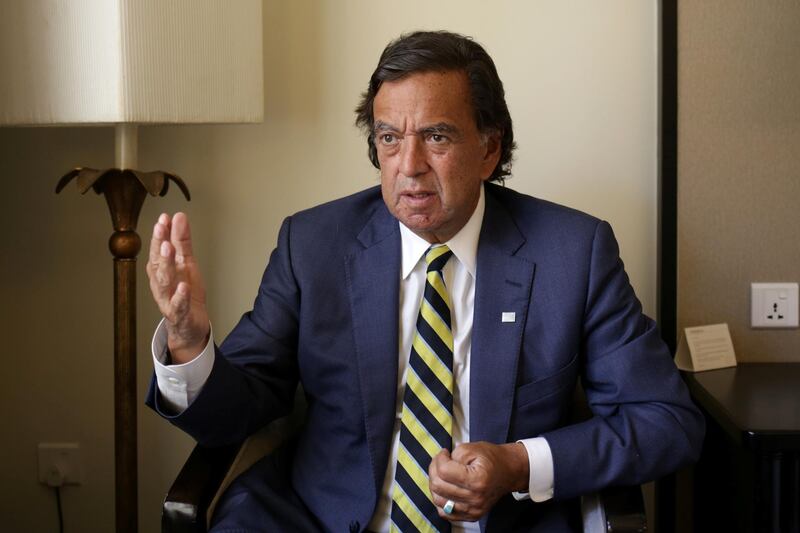A prominent American member has resigned from an advisory panel on the Rohingya refugee crisis, calling it a “whitewash and a cheerleading operation” for Myanmar leader Aung San Suu Kyi.
The sudden resignation on Wednesday of Bill Richardson, a former senior US politician and diplomat who considered Ms Suu Kyi a close friend, raises serious questions about international efforts to deal with the calamitous fallout of Myanmar military operations against the Rohingya Muslims that the United Nations has called "textbook ethnic cleansing".
Mr Richardson accused Ms Suu Kyi of an "absence of moral leadership" over the crackdown in Rakhine state and said they had had a heated exchange after he called for the release of two Reuters journalists arrested while covering the crisis.
A Myanmar government spokesman hit back on Thursday, accusing the former New Mexico governor of overstepping the mark in his stinging resignation letter.
"He should review himself over his personal attack against our State Counsellor," government spokesman Zaw Htay said, using Ms Suu Kyi's official title.
He said the issue of the journalists' arrests was beyond Mr Richardson's mandate and he should not have brought it up.
Mr Richardson's resignation offers possible insight into the thinking of Ms Suu Kyi, a Nobel Peace Prize laureate once revered as an icon of human rights whose leadership during the Rohingya crisis has shocked many outsiders.
A former US ambassador to the UN and energy secretary under Bill Clinton, Mr Richardsoncastigated Ms Suu Kyi for blaming outsiders for the crisis instead of looking honestly at military actions that have forced nearly 700,000 Rohingya to flee to squalid refugee camps in Bangladesh, where they have spoken of mass killings, rape and the obliteration of whole villages in Myanmar.
“She believes there’s a concerted international effort against Myanmar, and I believe she is wrong,” Mr Richardson said.
“She blames all the problems that Myanmar is having on the international media, on the UN, on human rights groups, on other governments, and I think this is caused by the bubble that is around her, by individuals that are not giving her frank advice.”
Ms Suu Kyi appears to want the 10-member advisory board, which is meant to implement earlier Rohingya recommendations made by a group led by former UN secretary general Kofi Annan, to validate her Rohingya policies, Mr Richardson said.
"The advisory board is mainly a whitewash and a cheerleading operation for the Myanmar government, and I'm not going to be part of it because I think there are serious issues of human rights violations, safety, citizenship, peace and stability that need to be addressed," he said. "I just felt that my advice and counsel would not be heeded."
This biting criticism of Ms Suu Kyi and resignation from the panel come as refugees cram camps in Bangladesh rife with crushing poverty, disease and an air of hopelessness.
More than 680,000 Rohingya Muslims have fled the military of majority Buddhist Myanmar, which began operations against them following attacks by an Islamic militant group on August 25 last year. The UN human rights chief has suggested that what’s happening to the Rohingya may be genocide.
Rohingya are severely discriminated against in Rakhine state, where many have lived for generations. They have been denied citizenship, freedom of movement and other basic rights.
Mr Richardson, who has frequently negotiated for the release of Americans imprisoned in foreign countries, also said he was “very unhappy and distressed” by Ms Suu Kyi’s heated reaction to his plea that two Reuters journalists detained on charges of violating a British colonial-era secrecy law used by a former military junta to muzzle freedom of speech “be treated fairly and rapidly”.
“That brought almost an explosion on her part, saying there were issues related to the official secrecies act, that that was not my charter as a member of the advisory board,” he said. “It was a very heated exchange that we had.”
The journalists, who are both Myanmar citizens, were investigating the Rohingya crisis. They face up to 14 years in prison if convicted. Local media said their arrests were an attack on media freedom.
Some Myanmar officials were working hard to help people in Rakhine, Mr Richardson said, and he held out hope that the advisory panel might press the government to push through his suggestion of an investigation of widespread reports the military buried Rohingya victims in many mass graves.
Though he said members of the advisory board were generally “serious people that could be very helpful”, Mr Richardson had tough words for the panel’s leader, Surakiart Sathirathai, a former Thai foreign minister.
“There’s no agenda, there’s no plan to address some of the issues relating to safety, to citizenship,” Mr Richardson said. “I don’t want to be part of a whitewash, and I felt it best that I resign immediately.”





